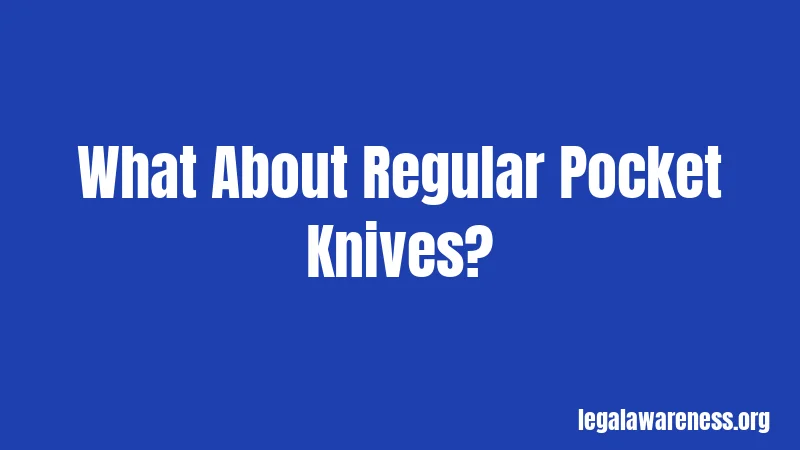New Jersey Knife Laws in 2026: The Strict Rules That Could Get You Arrested
Most people have no idea how strict New Jersey’s knife laws actually are. Seriously. You could be carrying something totally innocent, and it might be illegal. The penalties are real too—we’re talking felony charges, prison time, and a criminal record that sticks with you forever.
Here’s the thing: New Jersey doesn’t just ban certain knives. The state asks one critical question: why do you have it? Your answer matters more than you might think. Let’s break down exactly what you need to know to stay on the right side of the law.
What Makes New Jersey’s Knife Laws So Confusing?

Most states have straightforward rules about knives. New Jersey? Not so much. The state focuses on something called “explainable lawful purpose.” This phrase shows up again and again in the law, and it’s crucial.
Think of it like this: New Jersey doesn’t just ban certain objects. It bans the reason you’re carrying them. You could own a switchblade legally at home. Carry that same knife outside for no good reason? You’re committing a felony. Same knife, totally different legal outcome.
This creates a gray area that confuses a lot of people. And law enforcement can be strict about interpreting the rules. So pay attention to the details here.
Types of Knives That Are Flat-Out Illegal
Okay, pause. Read this carefully. These knives are basically always illegal to carry in public:
Switchblades open automatically when you press a button or spring. You don’t have to flip them open—they open on their own. New Jersey says these are weapons by default. No good reason you’d have one outside your house.
Gravity knives open automatically through gravity or centrifugal force. You shake them or flick your wrist, and the blade deploys. These are treated the same as switchblades under the law.
Daggers, dirks, and stilettos are fancy ways of saying “double-edged stabbing weapons.” These are illegal full stop. There’s basically no way to convince a judge these have a lawful purpose in public.
Ballistic knives shoot or propel the blade. Yeah, these exist. They’re definitely illegal. Don’t even think about these.
OTF knives (out-of-the-front knives) deserve special mention because they’re popular online. OTF knives have a button that shoots the blade straight out from the handle. Under New Jersey law, these fit the definition of either a switchblade or gravity knife. They’re illegal to carry without a lawful purpose.
Here’s where it gets important: it doesn’t matter that you never used the knife as a weapon. Just having one of these is a fourth-degree felony. That’s up to 18 months in prison and a $10,000 fine.
What About Regular Pocket Knives?

Okay, here’s where things get interesting. A normal pocket knife—the kind your grandfather carried—is usually legal. Pocket knives, Swiss Army knives, and basic folding knives with small blades typically get a pass.
But—and this is important—the context matters. The circumstances around why you have it and where you have it make all the difference. A chef carrying a kitchen knife to work? Legal. Someone randomly carrying that same knife through downtown Newark? Could be illegal.
Not sure what counts as a violation? Let me break it down. You’re breaking the law if you possess any weapon (including a normal pocket knife) under circumstances that aren’t “manifestly appropriate” for its lawful uses. That’s vague on purpose, and it puts you in a risky spot.
The safest approach: keep pocket knives under 5 inches and only carry them when you actually need them. Going camping? Fine. Going to a party? Leave it at home.
The “Explainable Lawful Purpose” Rule
This is the golden rule of New Jersey knife law. Hold on, this part is important.
You can be charged with a felony for possessing any prohibited knife “without any explainable lawful purpose.” That means you need a good reason for having it. And the burden falls on you to explain why you have it.
What counts as a lawful purpose? Here’s what the courts have decided:
Hunting or fishing with an appropriate knife? That’s legal. You actually need the knife for what you’re doing.
Work-related use counts too. A chef needs their knives. A construction worker carrying a utility knife? That’s fine. A carpenter with a folding knife at the job site? Legal.
Having one at home for self-defense is legally acceptable. A famous New Jersey case actually confirmed this. Even if you have a prohibited knife in your house for protection, that’s considered a lawful purpose.
Here’s where self-defense gets tricky: carrying a knife in public for self-defense? That’s not a lawful purpose in New Jersey. The state’s position is weird but firm: if you intend to use a knife for self-defense, you’re possessing it for an unlawful purpose. Yes, that’s an even more serious crime than just having a prohibited knife.
Penalties: What Actually Happens if You Get Caught

Let’s talk about what you’re really facing. This is serious stuff.
Possessing a prohibited knife without lawful purpose is a fourth-degree crime. You could face up to 18 months in state prison and a fine up to $10,000. That’s not a slap on the wrist. That’s a felony that goes on your permanent record.
Possessing a knife for an unlawful purpose (including self-defense in public) is even worse. It’s a third-degree crime. That bumps you up to three to five years in prison and up to $15,000 in fines. We’re talking serious prison time now.
What does a felony conviction actually do to your life? Pretty much everything. Your job options shrink. Finding housing becomes harder. Background checks flag you. Student loans dry up. It affects your life in ways you can’t anticipate right now.
And honestly, this part most people miss: a felony conviction can result in losing your right to own firearms. If gun rights matter to you at all, a knife conviction can take that away.
Where You Absolutely Cannot Have Knives
New Jersey has specific places where knives are banned outright. No exceptions.
School grounds are completely off-limits. That includes K-12 schools and colleges. You cannot possess any knife on school property without written authorization from the school. None. Zero tolerance here.
Court buildings have their own security rules. You can’t bring knives into courthouses or judicial facilities.
Government buildings generally prohibit weapons including knives. While the law isn’t specific about every building, law enforcement takes this seriously.
Some towns and cities have added their own rules too. Camden, for example, has city ordinances that are stricter than the state law. Before you carry a knife through a specific town, it’s worth checking local rules.
What About Home Possession?
Confused about the difference? Let me clear it up.
At home, the rules are different. You can legally possess even prohibited weapons (gravity knives, switchblades, and the rest) in your own home for self-defense. The courts have confirmed this. One case involved someone answering their door holding a machete—that was deemed legal self-defense in the home.
But there’s a huge difference between home and outside. The moment you leave your property, those same knives become illegal without a crystal-clear lawful purpose. And self-defense is not that purpose in public.
Think of it like a traffic ticket, but way more serious. At home: legal. Outside with no good reason: felony.
Special Rules for Sales to Minors
If you’re under 18 or buying for someone under 18, there are restrictions.
It’s illegal to sell or give someone under 18 a knife with a blade over 5 inches or an overall length over 10 inches. This is one of the few specific measurements in the law.
That Swiss Army knife you’re eyeing? Should be fine. Those hunting knives you see online? Not for minors.
How to Safely Carry a Knife in New Jersey
Here’s what you can actually do without legal risk:
Get a small pocket knife. Keep the blade under 5 inches. Make sure it’s not a switchblade or gravity knife. Basic folding knives are fine.
Only carry it when you have a reason. Camping trip? Perfect. Going to dinner downtown? Leave it at home. Work as a chef? Keep it at work.
Never carry it for self-defense. This can’t be overstated. Self-defense is not a lawful purpose in New Jersey public spaces. If you carry a knife for personal protection, you’re breaking the law.
Know where you’re going. Schools, courts, and certain government buildings are off-limits. Some towns have stricter rules. Check before you travel.
Understand what you’re carrying. Know the exact type of knife you have. Can the blade deploy automatically? Is it a gravity knife? If you’re unsure, don’t carry it.
If a Police Officer Stops You With a Knife
Here’s what will probably happen if a cop finds a knife on you:
They’ll ask questions. Why do you have it? Where are you going? Do you work with it? The answer matters. A lot.
If your answer satisfies them, you might walk. If it doesn’t, you’ll likely be arrested. It’s that simple in New Jersey.
Once you’re arrested on a weapons charge, you’re facing serious legal consequences. Get a lawyer immediately. Don’t talk to police without one. A good defense requires proving your lawful purpose or challenging the officer’s evidence that you even had a weapon.
This is genuinely one of those situations where getting legal help fast makes a massive difference in your outcome.
Recent Changes and What’s Coming
New Jersey’s knife laws haven’t fundamentally changed in recent years, but enforcement has gotten stricter. Police departments take weapons charges seriously, especially in urban areas.
There’s been ongoing debate about making the laws clearer—the “explainable lawful purpose” standard is genuinely vague and causes problems. But for now, this is what the law says. Assume it stays this way.
Frequently Asked Questions
Can I carry a pocket knife in my car? It depends on the knife and the context. A small folding knife? Probably okay. But if a cop pulls you over and finds it, be ready to explain why you have it. The “manifestly appropriate” test applies to car possession too.
What about a multi-tool or Swiss Army knife? These are generally legal if the blade is under 5 inches and it’s not a switchblade. They’re considered utility tools, not weapons. But keep it under 5 inches to be safe.
Is it legal to own these knives at home, just never leave with them? Yes. You can own prohibited knives at home for self-defense. The law protects in-home possession. Just don’t take them outside without a legitimate reason.
What happens if I buy a knife illegally online and it’s confiscated? You lose the knife. You probably face charges too if it violates the law. Shipping restrictions apply to certain knife types. Buying online doesn’t bypass New Jersey law.
Can I carry a knife if I have a permit? There’s no knife carry permit in New Jersey. Some states have concealed carry permits for knives. New Jersey doesn’t. The rules apply to everyone equally.
Final Thoughts
New Jersey takes knife possession seriously. Seriously seriously. The laws are stricter than most states, and the penalties are real.
The core rule is simple: you need an explainable lawful purpose for any knife you carry outside your home. Self-defense doesn’t count. Random carrying doesn’t cut it. Work, hunting, fishing, camping—those work. Everything else is risky.
When in doubt, leave the knife at home. It’s not worth a felony conviction that follows you forever. If you do get charged with a weapon violation, talk to a criminal defense attorney immediately. Your future literally depends on it.
Stay informed, stay legal, and when you’re unsure, look it up or ask a lawyer. Better safe than facing years in prison.
References
New Jersey Statutes 2C:39-3 – Prohibited Weapons and Devices
American Knife and Tool Institute – New Jersey Knife Laws
New Jersey Code of Criminal Justice – Weapons Regulations
LegalClarity.org – New Jersey Knife Laws 2025
State v. Montalvo – New Jersey Supreme Court on Home Self-Defense (2017)
